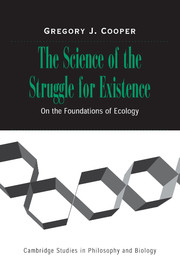Book contents
- Frontmatter
- Contents
- Introduction
- Acknowledgments
- 1 The Struggle for Existence
- 2 The Roots of Controversy
- 3 Must There Be a Balance of Nature?
- 4 The Pursuit of Ecological Generality
- 5 Model Building: A Controversial Craft
- 6 Theoretical Explanation and Fundamental Laws
- 7 The Explanatory Continuum
- 8 Theories, Models, and Explanatory Tools
- Epilogue
- References
- Index
4 - The Pursuit of Ecological Generality
Published online by Cambridge University Press: 05 May 2010
- Frontmatter
- Contents
- Introduction
- Acknowledgments
- 1 The Struggle for Existence
- 2 The Roots of Controversy
- 3 Must There Be a Balance of Nature?
- 4 The Pursuit of Ecological Generality
- 5 Model Building: A Controversial Craft
- 6 Theoretical Explanation and Fundamental Laws
- 7 The Explanatory Continuum
- 8 Theories, Models, and Explanatory Tools
- Epilogue
- References
- Index
Summary
INTRODUCTION
At the close of the previous chapter I suggested that part of the explanation for the tenacity of the debate surrounding the balance of nature traces back to a desire to find genuine ecological laws. This a priori need to find a strong level of biological organization in ecological phenomena is grounded in part in the presupposition that the very possibility of a general science of ecology turns on the existence of such structure. Looking from the other direction, from the direction of those who would challenge the balance of nature perspective, these worries would appear to be well-founded. The “new” ecology, with its emphasis on the contingency and historicity of the ecological domain, seems to call the pursuit of general ecological knowledge into question. If each ecological circumstance is a unique constellation of causal factors shaped by its own idiosyncratic historical context, then it is hard to see how a genuine theoretical understanding of ecological phenomena is even possible. Untangling this foundational debate requires a sharper philosophical image of the pursuit of ecological generality than we currently have. What kinds of general knowledge do ecologists seek? How are these epistemic goals embodied in the various methodological practices of the discipline? How does ecological complexity shape the process? What are the prospects for uncovering genuine laws in ecology? The present chapter develops a philosophical account of generalizations in ecology that provides the resources for addressing these questions.
- Type
- Chapter
- Information
- The Science of the Struggle for ExistenceOn the Foundations of Ecology, pp. 96 - 127Publisher: Cambridge University PressPrint publication year: 2003

